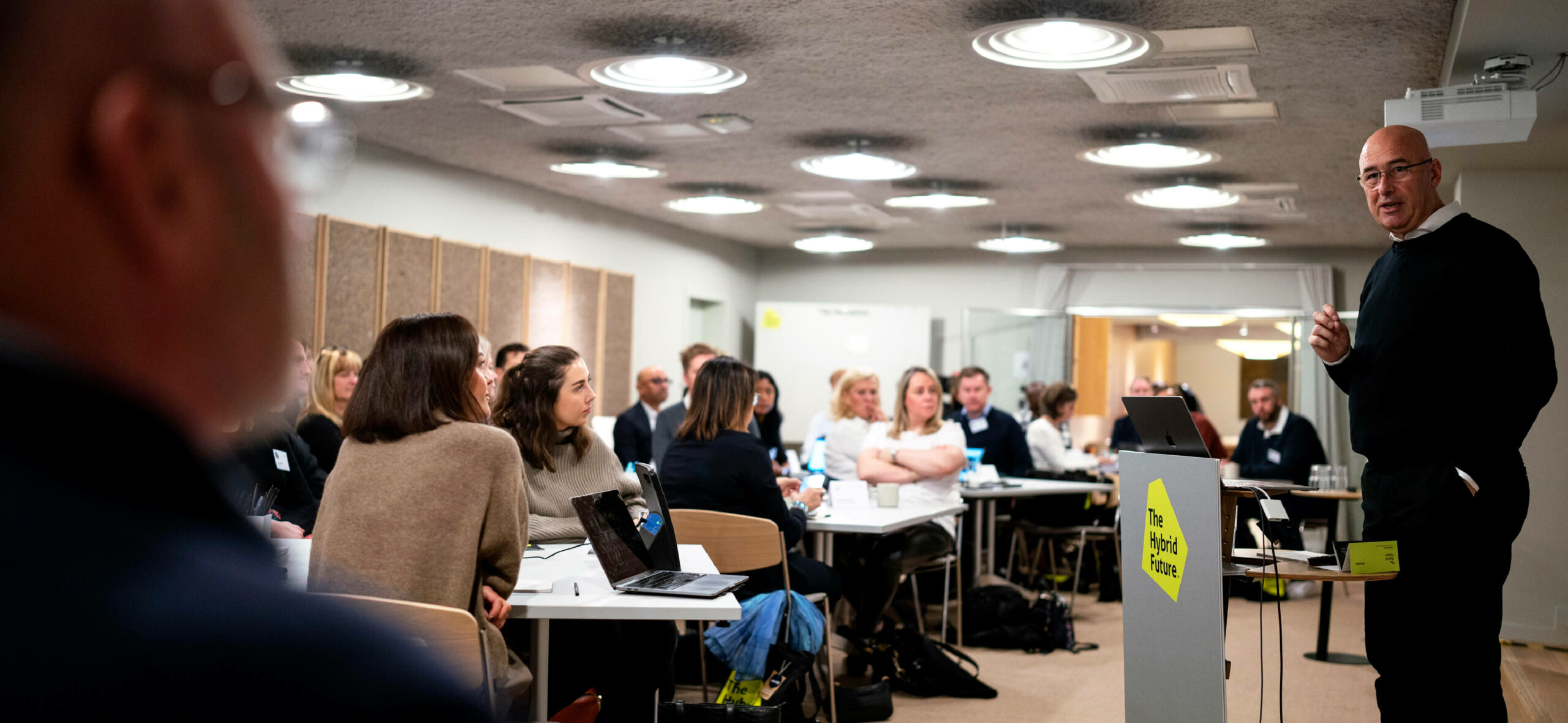Trending — The Hybrid Future —
THF — Symposium
THF –
Symposium
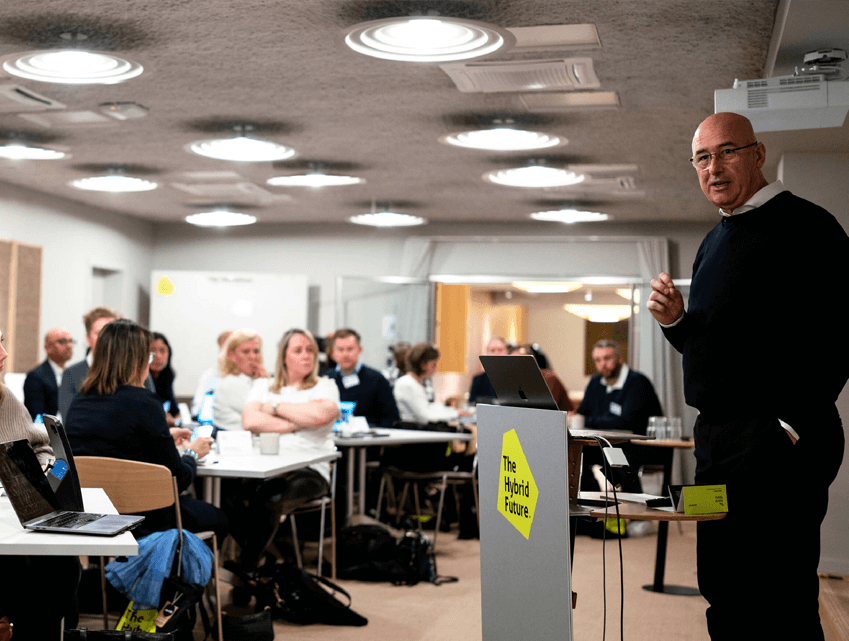
On Wednesday 8th November 2023, we proudly held our first annual symposium series for The Hybrid Future (THF) at our Chancery House office in London. As a Senior Researcher at Leesman, it was a privilege to welcome organisations ready to confront the dynamic challenges posed by hybrid working. Alongside our team, we were honoured to host distinguished presenters and speakers, each bringing a wealth of knowledge from their respective fields of expertise.
As a three year research project THF aims to equip our clients with comprehensive data and insights from their organisations, understanding the true impact hybrid working is having. This initiative represents a significant collective goal to deepen our understanding of the complex impacts of hybrid working at different levels within the corporate world, and extends to broader aspects of life.
The symposium provided an invaluable opportunity to connect and discuss some of the recent findings and actively exchange ideas. This vibrant dialogue between participants and speakers created an engaging and interactive experience from the very start. The event opened with an introduction from our Founder & CEO, Tim Oldman, which laid the groundwork for a day rich in captivating discussions. This was followed by Dr Peggie Rothe, Chief Insights & Research Officer, and I presenting the key findings from the first two campaigns from THF.
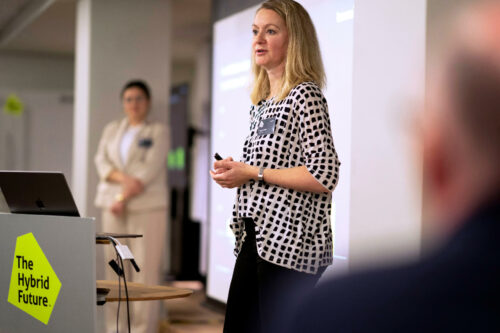
We began by delving into the complex dynamics of social connection and collaboration in the age of hybrid.
Senior leaders often feel socially disconnected and excluded from important discussions when working remotely — a challenge that is less pronounced for managers and individual contributors by comparison.
The topic of ‘how different generations are adapting to the impact of hybrid working’ was initially raised at one of our early THF board meetings and it is fascinating to see that we are gradually being able to provide insights and answers to these questions as we progress throughout the longitudinal study.
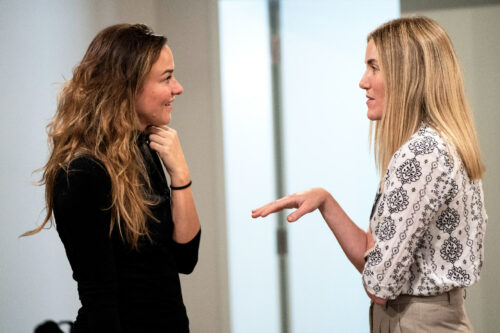
Leesman’s THF data also indicated gender differences in socialising after work, where women tend to socialise less frequently than men, but at the same time they report feeling less disconnected from their colleagues compared to men. This observation sparked a rich discussion prompted by one participant who emphasised the value of meaningful connections. She suggested that even infrequent but deep connections can greatly reduce feelings of isolation.
Duncan Young, Wellbeing Strategist and Executive Coach also emphasised the critical importance of social connection as the key to happiness during his session. In addition, Phil Higham, Co-Founder and Director of Realworth, conducted an interactive online survey of event participants, which revealed that isolation and social disconnection are the biggest negative impacts of hybrid working for most employees. This emphasises the critical importance of maintaining social connections with colleagues when working remotely and the role of the office in reducing isolation and promoting satisfaction in hybrid working environments. It highlights that nurturing these connections should be one of the key purposes of the workplace, going far beyond just after-work activities.
As the data presentation continued, we took delegates through other pivotal topics that we had uncovered, such as the reasons behind employees’ visits to the office and how hybrid working has impacted their sense of belonging to the organisation.
The insights suggested that sense of belonging isn’t necessarily linked to an employee’s frequency of physical presence in the office, regardless of their role.
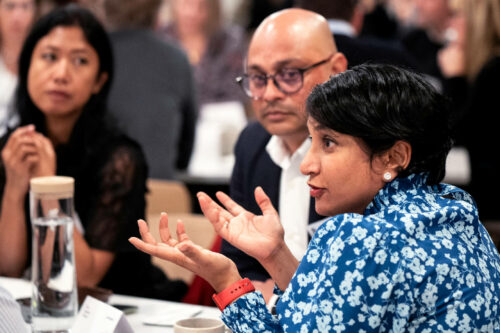
Instead, what matters is being recognised and valued in a transparent culture and having the opportunity to connect and socialise with colleagues in an environment that represents their common values, identity and purpose. This powerful message can resonate with employees and influence their engagement, regardless of how often they physically visit the office. From here, we began to highlight how senior leaders have a more compelling reason to visit the office compared to individual contributors, emphasising purposes like meetings, bonding or socialising with others, building professional relationships, and supervising their team, which are crucial for their roles. In contrast, individual contributors’ primary purpose for office attendance are usually meetings or down to mandates.
The event settled with a compelling session by Luis Canto e Castro, a D&I Consultant and Disability Advocate, who shared his personal experiences and professional insights. He spoke about the constant challenges he faces when he is present in workplaces and emphasised the pressing need for enhanced accessibility and inclusivity in physical and organisational structures. This underscored the considerable work still required to achieve an equitable workplace for everyone. Additionally, Luis discussed the double-edged nature of hybrid working, recognising its comfort but also warned of the risk of marginalisation. He stressed his preference for the collaborative energy of face-to-face meetings and the importance of occasional social interactions to avoid isolation.
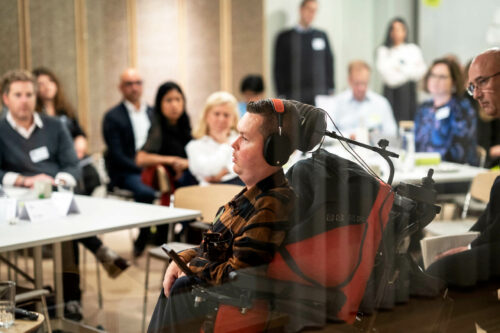
The first annual THF Symposium was an invaluable platform to explore the complexities of hybrid working.
The various insights from our speakers and participants highlighted not only the challenges but also the opportunities of this working model. It became clear that while hybrid working offers flexibility, it also requires thoughtful strategies to maintain employee connection, engagement and wellbeing.
A notable concern is that the senior leaders who often design these strategies may base their decisions on their personal experiences and needs. Our data suggests that the reasons, needs and patterns vary across different roles and therefore highlights the necessity of in-depth research and direct employee engagement to prevent strategy failures. As Phil Higham insightfully remarked, success in this landscape depends on asking “the right questions” and, more importantly, asking them of the right people. Armed with this knowledge, we are better able to make inclusive decisions and cultivate a more connected and supportive work environment that aligns with our changing work-life dynamics.

